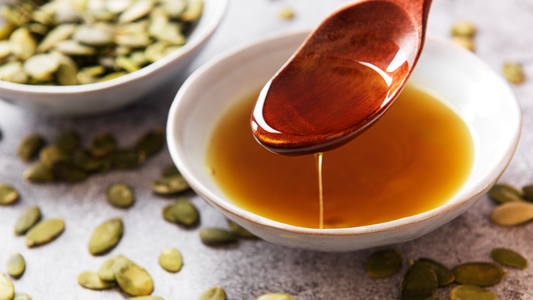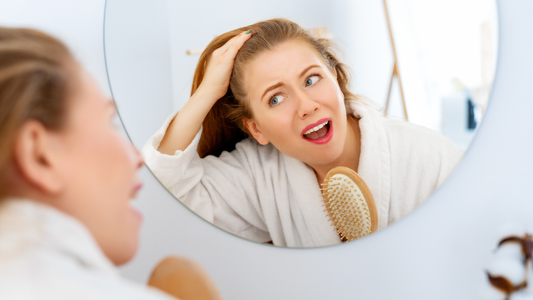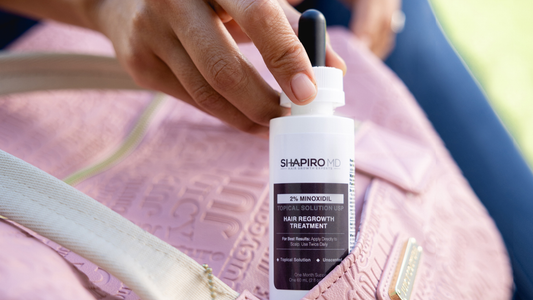Hair loss can occur due to a variety of reasons, commonly genetics, certain medications, and even stress; however, if hair loss is linked to a skin condition like seborrheic dermatitis, selenium sulfide may be an appropriate treatment.
Selenium sulfide is an FDA-approved substance that can be used to treat conditions that contribute to hair loss, such as seborrheic dermatitis, dandruff, and tinea versicolor.
Research shows that selenium sulfide is a safe and effective active ingredient for use in topical treatments such as lotions, shampoos, and foams. Common brands that rely on selenium sulfide include Selsun®, Exsel® and Head and Shoulders® shampoos.
Summary
- Selenium sulfide is used in shampoos and lotions that help to treat & hair skin conditions such as dandruff, seborrheic dermatitis, and psoriasis.
- Skin conditions that cause severe itchiness and irritation can result in hair loss due to excessive scratching and inflammatory response.
- Treatments that contain selenium sulfide have concentrations of between 1 and 2.5%.
- If selenium sulfide is misused, it can make the symptoms it's intended to treat worse, so it's important to read product instructions or follow your doctor's directions.
What Is Selenium Sulfide?
Selenium sulfide is the active ingredient in some shampoos and lotions used to treat scalp conditions that cause itching or irritation. An anti-infective, selenium sulfide is typically used to treat fungal skin conditions that lead to flaking or scaling on the scalp.
Products may contain varied concentrations of selenium sulfide depending on the condition they’re treating, but selenium sulfide concentrations generally range from 1% to 2.5%.
Selenium sulfide shampoo
Medicated shampoos that contain selenium sulfide are great for treating skin conditions that affect the scalp, such as seborrheic dermatitis. They also serve as great anti-dandruff solutions.
These types of shampoo are available over-the-counter (OTC) or with a doctor’s prescription.
OTC formulations may be gentle enough for daily use, while prescription formulations may be used less frequently.

Selenium sulfide lotion
Selenium sulfide lotions are another topical approach that may be used for conditions of the scalp or skin elsewhere on the body.
Lotions with a 2.5% and higher concentration of selenium sulfide are only available with a prescription in the U.S.
What Conditions Can Be Treated with Selenium Sulfide Shampoo?
Selenium sulfide shampoo can help prevent hair loss by treating skin conditions that irritate, dry out, or inflame the scalp.
Keep in mind that selenium sulfide products do not directly treat hair loss. Rather, they treat the underlying fungal conditions that can result in hair loss.
Dandruff
Dandruff can indirectly cause hair loss as it induces itching, which may prompt you to scratch your scalp. This can damage hair follicles and cause temporary hair thinning.
Selenium sulfide shampoo can be used to remedy dry, itchy, or flaky skin caused by dandruff. Once the dandruff or flaking and scaling is treated, your hair has a better chance of regrowing.
Lower concentrations of selenium sulfide are typically found in daily-use shampoos, while stronger concentrations are available to treat severe dandruff.
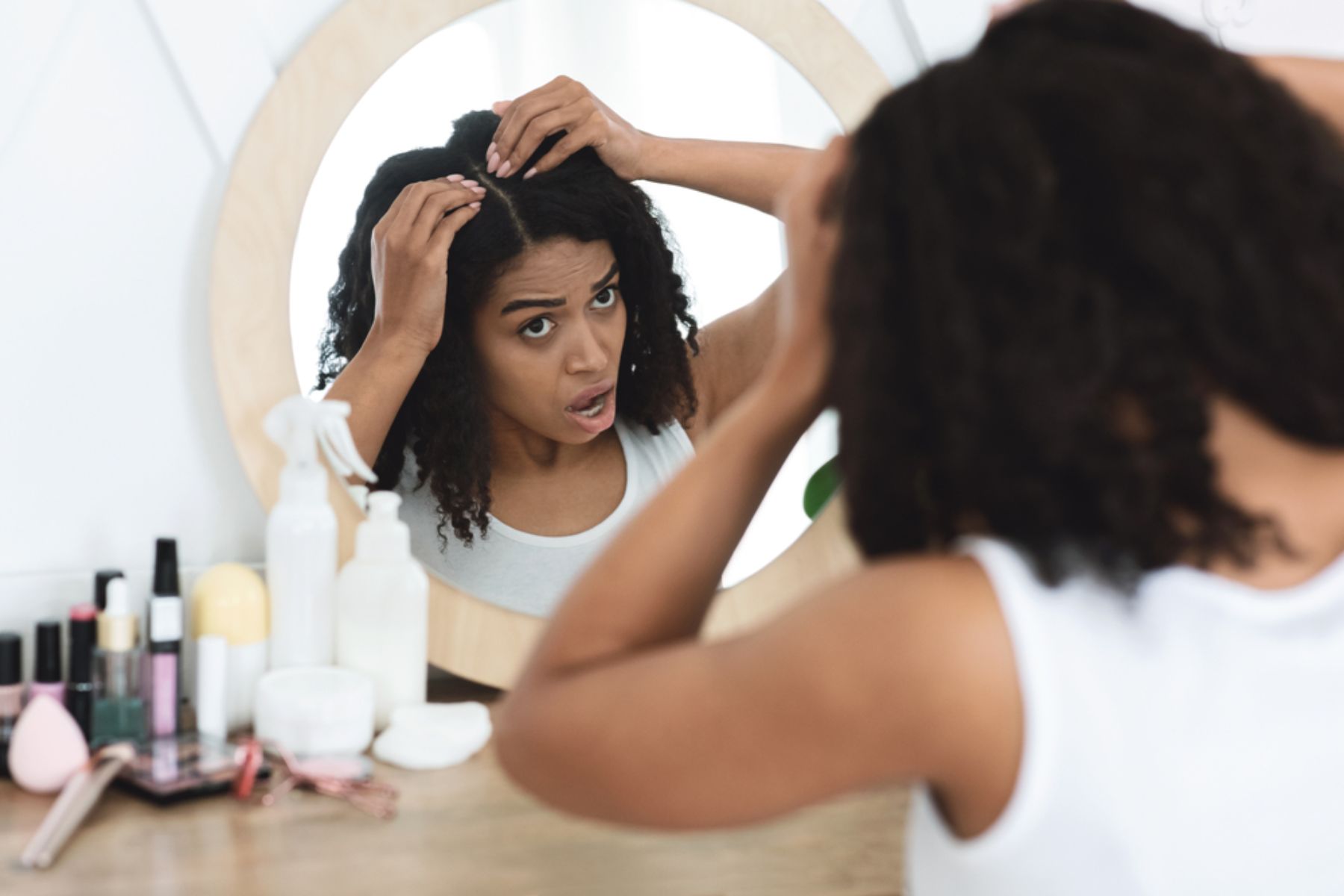
Seborrheic dermatitis
Sometimes called seborrheic eczema, seborrheic dermatitis is a condition that’s characterized by dry, itchy, inflamed patches of skin and even yellow scales.
It typically affects the scalp, face, and various skin folds, such as the armpits or groin. The severe itchiness caused by the condition can lead to increased scratching which disturbs the hair growth cycle.
Hair loss caused by seborrheic dermatitis is referred to as seborrheic alopecia.
Seborrheic dermatitis may sometimes be mistaken for severe dandruff. However, there are some clear distinctions, such as where it occurs and what it looks like.
Dandruff is characterized by white flakes, while white or yellow scales and reddened skin typically accompany seborrheic dermatitis.
Selenium sulfide is effective in combatting seborrheic dermatitis as it reduces the growth of the yeast responsible for the infection. When seborrheic dermatitis occurs in babies or young children, it's commonly known as cradle cap—but doctors don’t typically prescribe selenium sulfide shampoos or lotions to children younger than two.
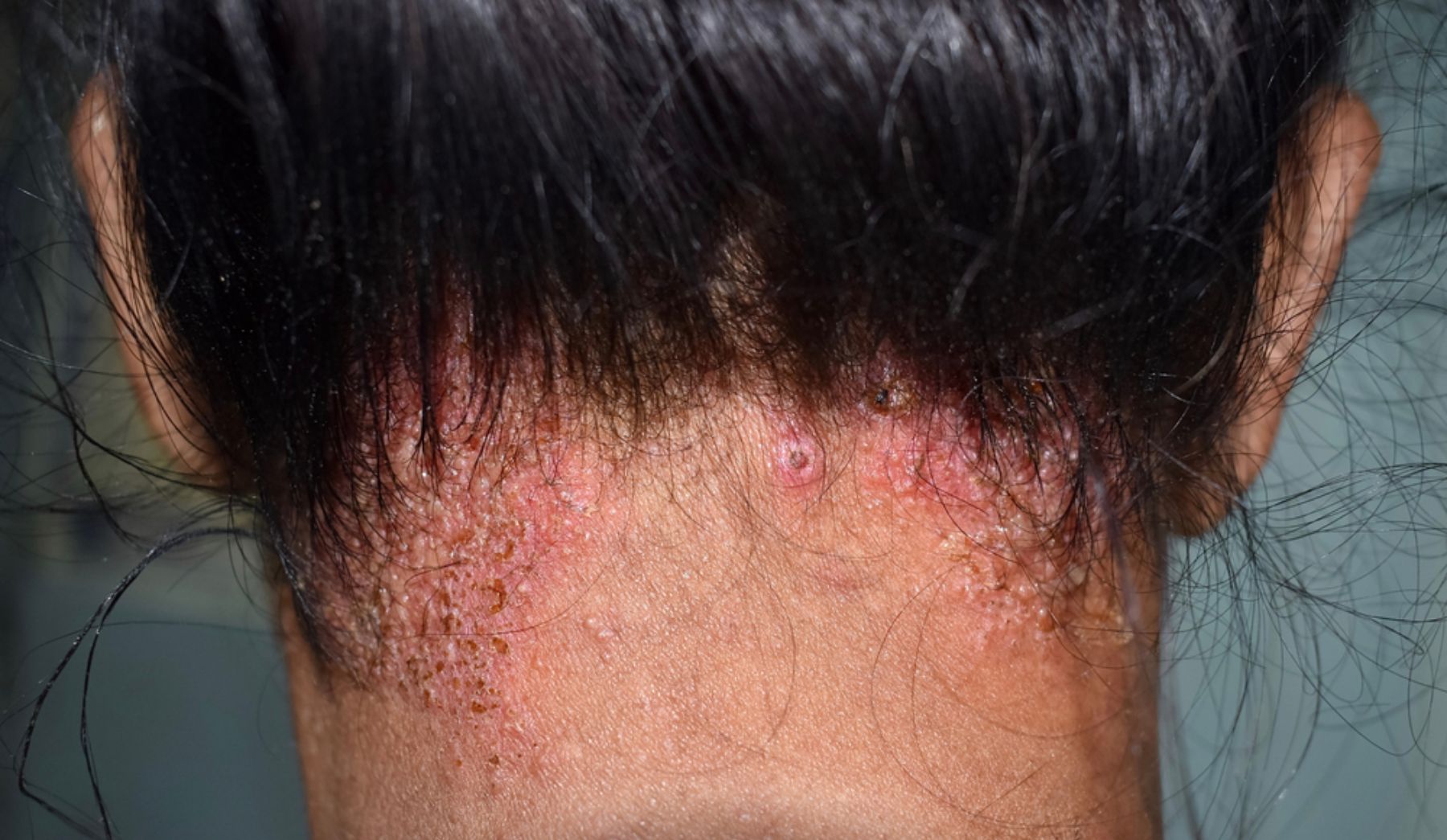
Tinea versicolor or pityriasis versicolor (PV)
Selenium sulfide lotion can be used to treat tinea versicolor, which is also called pityriasis versicolor.
This fungal skin condition causes discolored lesions to form on the skin and typically affects the back, shoulders, and upper chest.
Hair thinning or hair loss has been identified as one of the symptoms of tinea versicolor. In one study, 61.5% of patients with tinea versicolor experienced hair loss in lesions on the forearms, neck, beard region, and abdomen.
Selenium sulfide treats tinea versicolor by slowing the growth of the fungus that causes the infection. It also relieves itchy, flaky, or dry skin that can trigger excessive scratching, which contributes to further hair loss.
When treating tinea versicolor, you can apply the medication to any affected areas except the face and genitals.
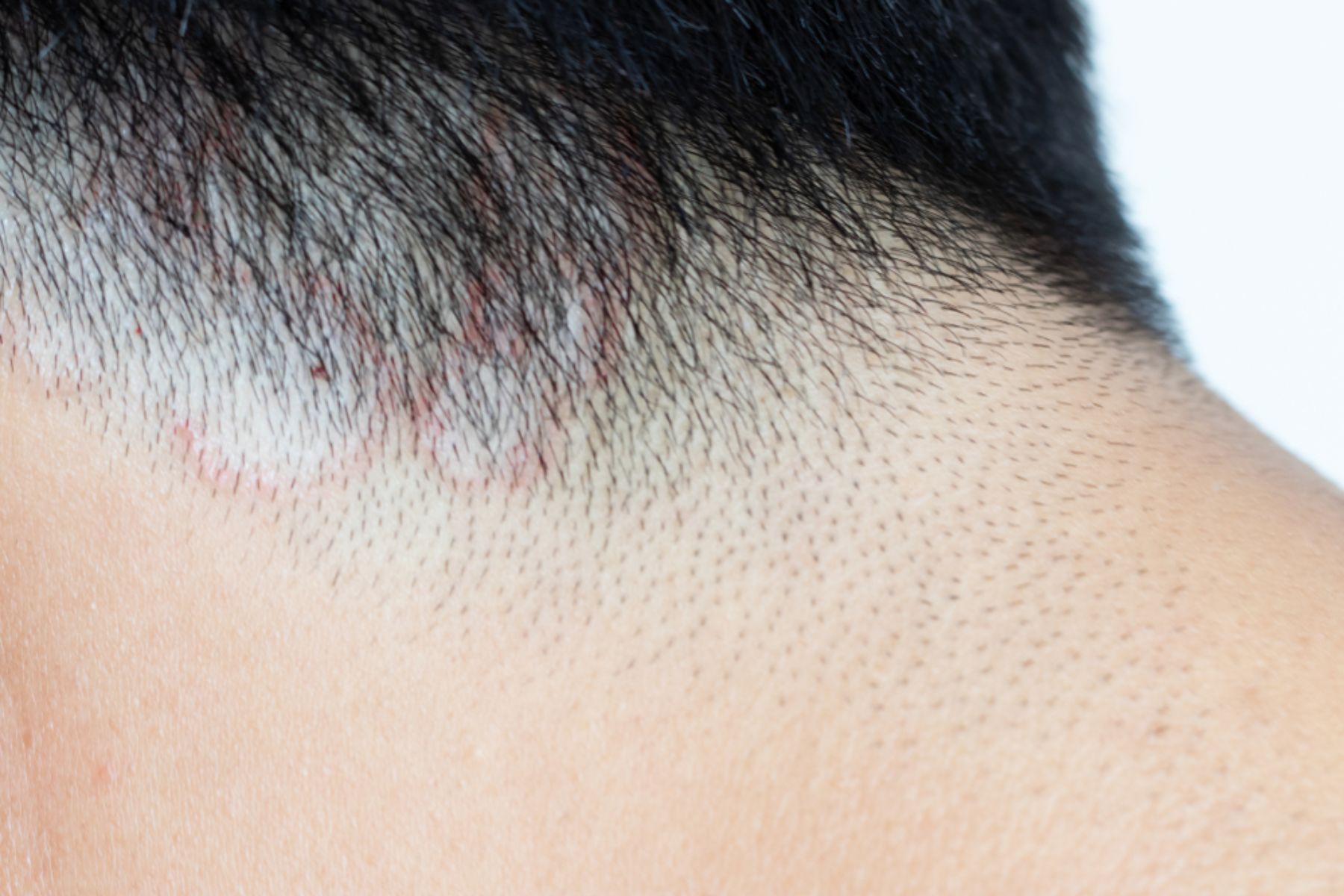
Tinea capitis
Commonly known as ringworm, tinea capitis is a contagious fungal infection that causes patchy hair loss and scaly skin on the scalp. The condition is common among children.
Using selenium sulfide shampoo a few times per week can help the fungus disappear more quickly. This shampoo can be used in addition to oral antifungal medications in more severe cases.
Psoriasis
Psoriasis causes dry, scaly patches of skin that are prone to itching. It’s an immune system skin disorder that can appear anywhere on the body but mainly affects the elbows, knees, lower back, and scalp.
Because psoriasis causes itching, people with the condition are likely to scratch affected skin—this can lead to temporary hair loss.
To treat hair loss linked to psoriasis, selenium sulfide shampoo or lotion can be effective. For mild cases of psoriasis, over-the-counter medicated shampoos work well, but anything more severe may require a doctor’s prescription for a stronger selenium sulfide treatment.
How Do I Use Selenium Sulfide for Hair Loss?
How you use selenium sulfide treatments will depend on the following:
- The condition you’re treating.
- The type of selenium sulfide product you’re using—a lotion, foam, or shampoo?
- The strength of the formulation.
If at any point you experience adverse reactions, contact your doctor for help.
Method
Only use your shampoo, lotion, or foam as directed by your doctor or the instructions on the label.
-
**For shampoo: **Apply directly to a wet scalp and leave it on for a few minutes (follow the label instructions or your doctor’s advice), then rinse thoroughly.
Selenium sulfide shampoo can also be used on the body by working up a lather and rinsing it off after ten minutes (or as your doctor has directed).
Do not use the shampoo on inflamed or broken skin as it may cause irritation.
-
**For lotion: **Like shampoos, selenium sulfide lotion can also be used to treat conditions of the scalp, such as dandruff and seborrheic dermatitis, or skin conditions that affect the rest of the body, such as tinea versicolor.
The lotion is typically applied and left on the skin for a period of time before it’s rinsed off thoroughly.
After using either a shampoo or lotion, be sure to rinse your hands properly and avoid getting a selenium sulfide solution on skin that’s not being treated.
Frequency
How often you use selenium sulfide shampoo or lotion will depend on the condition you’re treating and its severity.
For example, anti-dandruff shampoos that can be found on the shelves of a drugstore may be used every day, while prescription shampoos may be used a few times per week.
Typically, adults and children who are using a 1% selenium sulfide shampoo or lotion for dandruff or seborrheic dermatitis can use it twice per week, while those prescribed selenium sulfide 2.5% typically use it once a day for seven days.
The frequency of use for infants and young children should be determined by a healthcare professional.
Precautions
Some important things to note before starting selenium sulfide treatment include:
- The treatment should not be used on children aged two or younger.
- Do not use the shampoo or lotion on areas of the skin that are broken—for example, cuts and scratches.
- Do not expose your hair, skin, or scalp to selenium sulfide for long periods; always follow the product instructions.
- Do not get the product in your eyes.
- Remove all your jewelry, as exposure to selenium sulfide may damage it.
- If you’re thinking of getting hair treatments—for example, coloring, perming, or bleaching your hair—wait 48 hours before or after using selenium sulfide to avoid hair discoloration or scalp damage.
- Always disclose any allergies and medications you’re currently using to your health care provider before starting treatment.
- Those who are pregnant and breastfeeding should also disclose this information prior to treatment. In the event that you become pregnant while using selenium sulfide, notify your doctor as soon as possible.
Food for Thought: What If I Have an Allergic Reaction? If you have a sensitivity to selenium sulfide or you do not use it correctly—for example, you use too much at a time or too often—you could make your symptoms worse. If you have an allergic reaction to selenium sulfide, you may experience the following symptoms: Blistering, peeling, redness, or itching at the application site. Irritation or burning sensations. Swelling of the face, throat, or tongue. Hives (a rash or raised welts that may be red or itchy, and that often sting). Breathing difficulties. Though allergic reactions to topical selenium sulfide treatments are rare, if you experience any of the above symptoms, seek immediate medical attention.
Benefits of Selenium Sulfide
Selenium sulfide can be really beneficial for those suffering from scalp and skin conditions that irritate, inflame, or dry out the skin.
Products containing selenium sulfide can help to:
- Treat dry, scaly, and itchy skin conditions.
- Heal fungal infections more quickly.
- Relieve skin inflammation.
- Treat conditions such as seborrheic dermatitis, psoriasis, tinea capitis, and tinea versicolor.
- Prevent temporary hair loss that occurs due to scratching.
- Return your hair to its normal growth cycle.

What Are the Risks or Side Effects of Using Selenium Sulfide?
Every treatment or medication you use carries the risk of an allergic reaction, so watch for blistering, skin irritation, or breathing difficulties that may indicate a selenium sulfide allergy.
If you do not follow your doctor’s directions or the product instructions—for example, if you use it too often or you don’t rinse it off properly—selenium sulfide may worsen your condition.
Some side effects of selenium sulfide include:
- Drying your skin or scalp.
- Making your hair oily or dry.
- Irritating your skin.
- Worsening inflammation.
- Discoloring the hair.
- Causing temporary hair loss.
- Irritating the eyes.
When should I contact a doctor?
If you experience an allergic reaction or your condition worsens after starting selenium sulfide treatment, contact your doctor or pharmacist for advice.
In the event that you experience a severe allergic reaction or anaphylactic shock, immediate emergency medical care is required.
What Are Some Alternatives to Selenium Sulfide?
If you have a selenium sulfide allergy or sensitivity, you may want to explore other treatment options.
Some alternatives to selenium sulfide include:
| Condition | Alternative treatments |
| Dandruff | Shampoos that contain zinc pyrithione, coal tar*, salicylic acid, or other antifungal ingredients. Home remedies, such as aloe vera and coconut oil may also be effective for milder cases.
*Tar-based shampoos can cause hair discoloration—especially if you have light-colored hair—and it can also make your scalp sensitive to sunlight. |
| Seborrheic dermatitis | Corticosteroids, such as fluocinolone and hydrocortisone; antifungal gels, shampoos, and creams; and oral antifungal medication.
Home remedies and a diet high in foods that fight inflammation, such as fresh fruits—especially vitamin C-rich foods—can help prevent flare-ups. |
| Tinea versicolor | Over-the-counter and prescription antifungal topical and oral medications. Examples of these include ciclopirox, ketoconazole, fluconazole, and itraconazole.
Limiting exposure to UV light, keeping the skin dry during humid weather, and practicing good hygiene can decrease your chances of a flare-up. |
| Tinea capitis | Oral antifungals, such as terbinafine, itraconazole, and fluconazole; and topical antifungals, such as products that contain ketoconazole or salicylic acid.
Practicing good hygiene and changing your bedding as well as cleaning your brushes can help prevent reinfection. Not sharing personal items or getting into contact with animals and people that might be infected, also helps. |
| Psoriasis | Topical therapy, including corticosteroid oils, creams, gels, and lotions; retinoids; calcineurin inhibitors; and salicylic acid.
Light therapy, including sunlight exposure; UVB broadband and UVB narrowband; and excimer laser therapy. Oral or injected medications, such as steroids and retinoids may also be used. |
What Should I Do Before Starting Selenium Sulfide Treatment?
Before you begin treatment, you should speak to your doctor or pharmacist and tell them whether you:
- Have any inflamed or broken skin.
- Are pregnant, trying to conceive, or currently breastfeeding.
- Have ever had an unusual or allergic reaction to other medications, foods, or selenium sulfide in particular.
Being honest with your health care provider can help you decrease the chances of developing any rare adverse effects related to selenium sulfide treatments.
Where Can I Get Selenium Sulfide?
Selenium sulfide can be found in common store-bought anti-dandruff shampoos, medicated shampoos, lotions, or foams.
Anything lower than 2.5% may be available over-the-counter in the U.S., but stronger solutions cannot be obtained without a prescription.
Most pharmacies, drugstore chains, and online retailers stock selenium sulfide products.
Where Can I Learn More about Selenium Sulfide?
Has your scalp been feeling extra itchy recently? Is all the scratching causing your hair to fall out?
Shapiro MD has you covered.
We stock a wide range of hair growth solutions and serums that contain the best ingredients nature and science have to offer, including both prescription and non-prescription options (prescribed online!)
Whether you need a new dandruff shampoo or something stronger, let our experts guide you.

